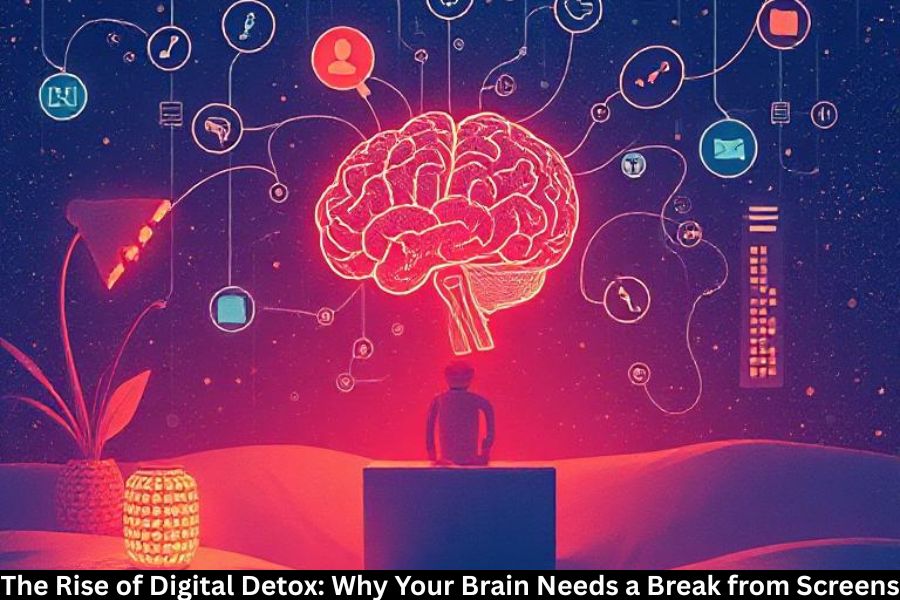In our hyper-connected world, screen time has become an inevitable part of daily life. From smartphones and laptops to TVs and tablets, we’re constantly glued to glowing rectangles. But as convenient and entertaining as these devices are, our brains are waving the red flag—and that’s where the digital detox movement is gaining ground.
If you find yourself endlessly scrolling, battling sleep problems, or struggling to focus, it might be time to disconnect to reconnect. This article explores the rise of digital detoxing, its benefits, and practical steps to reclaim your time, attention, and mental clarity.
What Is a Digital Detox?
A digital detox is a period of intentional disconnection from digital devices—especially those that connect to the internet. It can range from a few hours per day to full weekends or even week-long breaks.
The goal? To reduce screen-related stress, reset your mind, and rebuild healthy digital habits.
Why Is Digital Detox Gaining Popularity?
Information Overload
With 24/7 access to news, notifications, emails, and social media updates, our brains are bombarded with constant stimuli. This leads to decision fatigue, anxiety, and mental clutter.
Smartphone Addiction
Studies show that the average person taps their phone over 2,500 times a day. Notifications, dopamine loops, and FOMO (fear of missing out) keep us hooked.
Sleep Disruption
Excessive screen time—especially before bed—affects melatonin production, disrupting sleep cycles and leading to fatigue, irritability, and cognitive decline.
How Screens Impact Your Brain
1. Reduced Attention Span
Frequent digital interruptions impair our ability to focus. Multitasking on screens trains the brain to crave novelty, making deep concentration difficult.
2. Mental Fatigue
Constant engagement with screens doesn’t allow the brain to rest. Even leisure scrolling doesn’t equate to true mental recovery.
3. Increased Stress and Anxiety
Social media comparisons, email overload, and non-stop notifications trigger the body’s stress response, elevating cortisol levels.
4. Decreased Creativity
When the mind is constantly consuming, it rarely has time to wander—and daydreaming is critical for creativity and problem-solving.
Benefits of a Digital Detox
Improved Mental Clarity
Without screen distractions, your brain can rest, refocus, and recharge. Many people report sharper thinking and better decision-making after detoxing.
Reduced Anxiety
Disconnecting from social media and digital demands lowers stress levels and enhances emotional regulation.
Better Sleep
Limiting screen time before bed leads to deeper, more restorative sleep, thanks to melatonin returning to normal levels.
Enhanced Productivity
A detox improves your ability to focus on important tasks, reducing procrastination and boosting output.
Stronger Real-Life Connections
Digital detoxing encourages face-to-face interactions, building deeper, more authentic relationships.
Signs You Need a Digital Detox
- You feel anxious without your phone.
- You reach for your device first thing in the morning.
- You scroll aimlessly for hours.
- You check your phone during conversations.
- You feel mentally exhausted despite doing “nothing.”
If you nodded at any of the above, your brain is likely crying out for a break.
How to Do a Digital Detox: Step-by-Step
1. Set Clear Goals
Decide what you want to achieve—better sleep, more focus, or reduced stress.
2. Choose a Duration
Start with a few hours, then extend to full days or weekends.
3. Create Phone-Free Zones
Keep your bedroom, dining table, and bathroom screen-free to break the habit loop.
4. Turn Off Notifications
Disable non-essential alerts that constantly demand your attention.
5. Replace with Analog Activities
Read books, journal, go for a walk, or practice mindfulness instead of reaching for your phone.
6. Inform Your Circle
Let friends and coworkers know you’ll be offline for a bit—so they don’t misinterpret your silence.
Digital Detox Ideas for Different Lifestyles
For Professionals
Try “No-Email Evenings” or designate Sunday as a no-screen day to recharge.
For Families
Plan tech-free family dinners or board game nights to reconnect offline.
For Wellness Seekers
Incorporate nature walks, meditation, or yoga during your detox periods.
What Happens After a Digital Detox?
Post-detox, most people report feeling:
- Mentally refreshed
- More present
- Less anxious
- More productive
- Better rested
More importantly, they become conscious users of technology rather than passive consumers.
FAQs
Q1: Is a digital detox really necessary?
Yes, especially if you’re experiencing burnout, poor sleep, or concentration issues. Even short breaks make a noticeable difference.
Q2: How often should I do a digital detox?
Weekly mini-detoxes (like phone-free Sundays) and quarterly full-day breaks are ideal for balance.
Q3: Will it affect my work or social life?
Not if planned well. Informing your circle and using auto-responders can ease concerns.
Q4: Is there a best time to detox from screens?
Evenings and weekends are great starting points. Avoid screen time 1–2 hours before bed.
Q5: Can I use my phone for music or maps during a detox?
Yes, but keep it intentional—avoid falling back into mindless scrolling.



